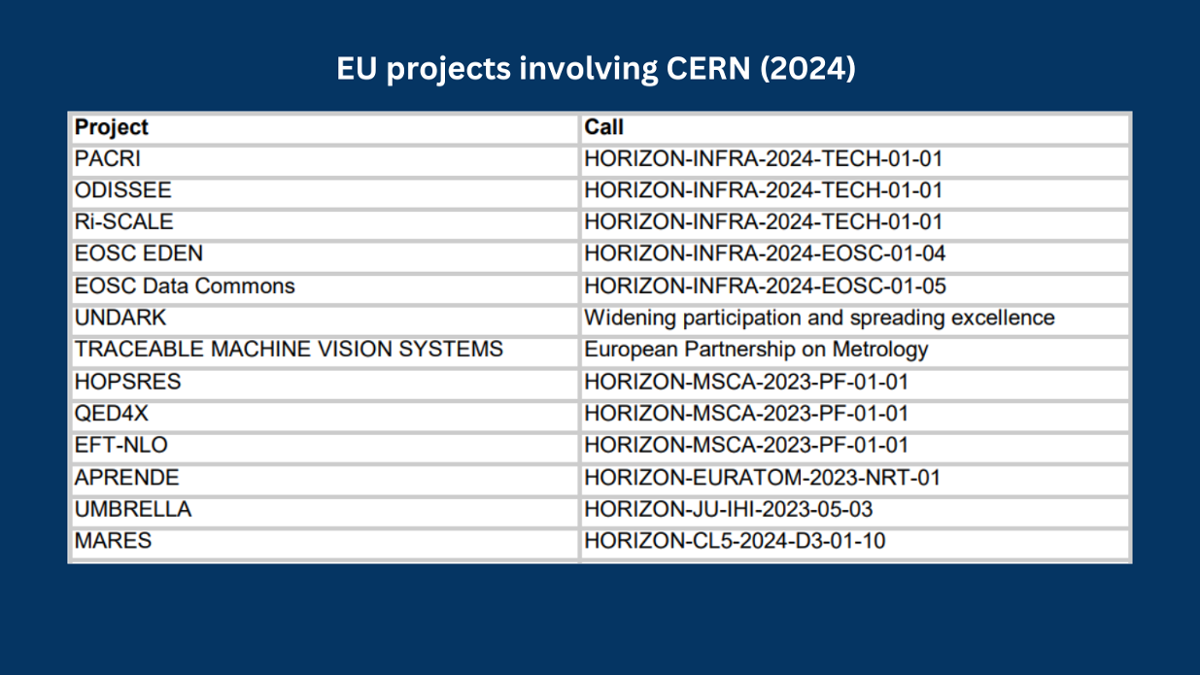| Welcome to the EU Projects @ CERN newsletter |
| In this edition, learn about three EU projects that are driving forwards innovation, discover the projects launched in 2024 that CERN is a part of, and read the first article in our new 'meet the team' series. Wishing you all a happy end to 2024 and a bright start to 2025. |
|
|
|
|
|
 |
| From wave energy to stroke care: The EU projects involving CERN that kicked off in 2024 |
| 13 new projects involving CERN either kicked off or began in earnest this year, tackling a wide range of topics. Find out more about them in our summary article here. |
|
|
|
|
|
| RF2.0: EU project targets better energy efficiency at CERN with improved grid monitoring tools |
|
|
The recently launched Research Facility 2.0 project is deploying 24 phasor measurement units on CERN’s electrical power distribution grid to analyse grid perturbations, improve power quality and develop a digital twin for greater efficiency. The goal: Make CERN more energy efficient.
It is still early in the project but there has already been marked progress towards achieving the goal of improving power consumption flexibility and network services at accelerator facilities.
|
|
|
|
|
|
|
|
|
| It takes all kinds of profiles to make CERN what it is today, and I think it’s really important that we all recognise and share this success |
| — Barbara Rusconi, EU projects finances at CERN — |
|
|
|
|
|
|
| Meet the EU Projects team: Barbara Rusconi on why CERN needs more than physicists |
|
| In the first article in our new ‘meet the team’ series, we speak to Barbara Rusconi from the finance team. She breaks down the difference between her job and the one carried out by EU support officers, talks about the EU projects she believes can have a positive impact on the world, and explains why she thinks it is not just scientists who make CERN special. |
|
|
|
|
|
|
|
|
| EU project to boost Europe’s space radiation testing capabilities marks significant milestone |
|
|
For two weeks in November, 10 companies and institutions were provided access to CERN’s new high-energy heavy ion irradiation facility to test electronics for use in space, with positive initial feedback from the users.
The HEARTS project is aiming to establish two new radiation testing facilities for space applications, one at CERN and the other at the GSI Helmholtz Centre for Heavy Ion Research in Germany.
|
|
|
|
|
|
|
|
|
| New EU project aims to advance plasma accelerator technologies for benefit of science and industry |
|
| The new PACRI (Plasma Accelerator Systems for Compact Research Infrastructure) project has recently been awarded €10 million in funding from the European Commission to develop highly important and ground-breaking plasma accelerator technologies, significantly reducing the size, energy consumption, environmental impact and cost of future facilities. |
|
|
|
|
|
|
|
|
|